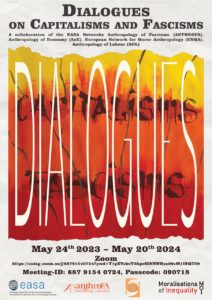Anthropological scholarship on old and new fascisms is presently beginning to coalesce into an emergent research field. Considering its heterogeneity, it is difficult to find an appropriate label for the subject of this network. The chosen title “anthropology of fascisms” underlines the phenomenon’s plurality as well as its historical dimension, it signals urgency and offers wider analytical purchase than descriptive labels such as “far right” or a focus on “authoritarian populism”. Debates on suitable concepts to grasp the topic of this network are likely to resurface at times and will reflect a variety of approaches. As research on anti-fascist movements, actors, and practices is so far all but absent from the ethnographic record, the network also directs attention also to counter-movements and counter-strategies to far-right and fascist tendencies. The Network was founded in February 2021.
The rise of fascist politics and value systems, often in lockstep with established conservative actors and institutions, challenges the very foundations of the liberal democracies which have dominated post-WWII capitalist societies. While the acceleration of far-right politics has long been neglected in scholarly and public discourses alike, the current shift in political consensus has generated a flurry of interest across the public realm and academia.
Aims
ANTHROFA situates research on fascisms in the realms of specific historical trajectories, everyday life, social relations, cultural expressions as well as institutionalized formal and informal politics. The network serves as a platform for exchange, communication, and mutual support amongst anthropologists of fascisms, the far right, and respective counter-movements. Network activities will contribute to the production of knowledge on actors, movements, practices, ideologies and subjectivities, as well as reflect on methodology, theory and ethics.
Besides elaborating political anthropology’s specific contribution to debates on fascism, the network aims to foster interdisciplinary dialogue and cooperation and stimulate debate on ways how to address (neo-) fascisms anthropologically from anti-fascist perspectives.
Rationale
Anthropological scholarship on old and new fascisms is presently beginning to coalesce into an emergent research field. Considering its heterogeneity, it is difficult to find an appropriate label for the subject of this network. The chosen title “anthropology of fascisms” underlines the phenomenon’s plurality as well as its historical dimension, it signals urgency and offers wider analytical purchase than descriptive labels such as “far right” or a focus on “authoritarian populism”. Debates on suitable concepts to grasp the topic of this network are likely to resurface at times and will reflect a variety of approaches. As research on anti-fascist movements, actors, and practices is so far all but absent from the ethnographic record, the network also directs attention also to counter-movements and counter-strategies to far-right and fascist tendencies.
The study of the increasing acceptance of and active support for authoritarian tendencies across local setting, classes, and age-groups calls for an understanding of the political beyond the realm of institutional politics on the state level. Anthropology is well placed to approach old and new fascisms on the interrelated levels of local micro-settings and structural political-economic processes, by examining issues as diverse as social activism, morality and affect, the politics of memory, performativity, social conflict, or the impact of capitalism in everyday settings. Such issues are gaining new relevance as anthropologists are developing approaches to the political in a societal formation that has been diagnosed as “post-hegemonic” or “post-democratic”. Anthropological research also emphasizes the socio-cultural embeddedness of old and new fascisms, both from a contemporary ethnographic and a longue-durée perspective by addressing their links to the economy, the state, social environments, and cultural production.
Aware of anthropology’s past and present entanglements with regressive and repressive politics, the network stands with the discipline’s commitment to human dignity and social justice. Researching old and new fascisms from this perspective poses specific challenges to anthropologists’ professional ethics. Studying the “repugnant other” (Harding) forces us to reflect upon our position as researchers and politically engaged citizens. How do we negotiate the anthropological remit to re-construct “the native’s point of view” with our own opposition to fascist convictions? How do we gauge the commitment to honesty, trust and confidentiality vis-à-vis the field when this might jeopardise the research altogether?
Planned activities
- Establishing and maintaining a network of interested researchers.
- Stimulating discussions on the methodological, epistemological, political, and ethical implications of research on fascisms.
- Organizing EASA conference panels and workshops in non-conference years.
- Maintaining the ANTHROFA EASA homepage and establish a safe online communication environment to share news, reports, and reflections as the need arises (e. g. Weblog, social media profiles or messenger groups, digital co-working infrastructure).
- making the network’s research output accessible to a wider audience in terms of a public anthropology approach
- Reaching out to civil society actors and maintaining close dialogue with them.
